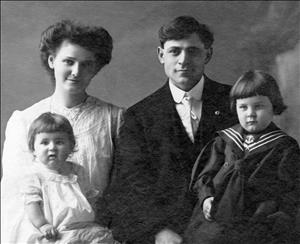In this People's History, Dorothea (Pfister) Nordstrand (1916-2011) recalls what "family medicine" meant at a time when professional health care was often not available. The Pfister family homesteaded in a log cabin near Tiger in 1911 and moved west to Seattle in 1919. The Dad of the story is Joseph Pfister (1883-1947), the Mom is Mary Annie (Gierhofer) Pfister (1888-1962), and her brother Jack is John Joseph Pfister (1907-1973). In 2009 Dorothea Nordstrand was awarded AKCHO's (Association of King County Historical Organizations) Willard Jue Memorial Award for a Volunteer, for contributing her vivid reminiscences to various venues in our community, including HistoryLink.org's People's History library.
Dr. Mom
In the years of my growing up (I was born in 1916), any illnesses in our family were dealt with by my mother. Mom had a wealth of knowledge learned over the years our family lived on a homestead near Tiger in the Pend Oreille country of northeastern Washington state, where there wasn’t a doctor available to us. Families learned from each other and from experience.
When Mom was feeding the pigs one day, one of them bit her thumb to the bone. Mom wrapped her bleeding hand in her apron and ran to our nearest neighbor, who helped clean it up and applied a heavy, black spiderweb to the wound before wrapping it in a clean cloth. The thumb healed up as good as new.
Cascara bark, nettles, and ginger root had specific uses, and were always in Mom's medicine box.
I remember well the time my Dad came down with a frightening case of pleurisy, and his heavy, labored breathing could be heard all over the house. The pungent odor of eucalyptus oil added to water boiling on the stove had cleared every sinus in the place, but Dad’s breathing was still very difficult and his chest painful.
Mom sent my brother, Jack, to the root cellar for a dozen of the big, yellow onions stored there, cut them into slices and set a panful to fry. She pinned several layers of flannel over the chest of Daddy’s long johns and spooned a pile of the blazingly hot fried onions onto that. As each batch of onions cooled it was replaced by another, until I heard Dad say, in the first normal voice we had heard from him in days, “That’s enough. Not one more onion, please.”
Dad would tell the story and, chuckling, would say that the fear that one of those blazing masses of onion would slip off the flannel and get onto his bare skin scared the pleurisy out of him. Mom would smile her gentle smile and remind him that the old fashioned remedy had worked. From that time on, his breathing had become more and more normal until every wheeze and whistle was gone.
When I was telling the above story to a friend, she told me the onion remedy was used in her family, too, only her family gave it a different twist. When her grandmother was frying up the onions for grandfather’s chest, they smelled so good she got two spoons and buttered some slices of bread. As the onions cooled on his chest, they each spooned some of them onto their bread and made a meal of the pungent curative.
Isn’t that a picture?

